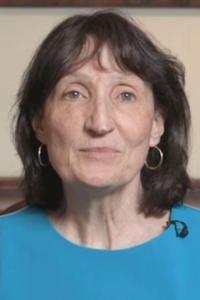
This year’s Outstanding Educator in Diabetes Award recipient, Denise Charron-Prochownik, PhD, RN, CPNP, FAAN, has worked for decades to educate teenage girls with diabetes about their reproductive health.
Dr. Charron-Prochownik accepted the award Saturday, June 26, and shared her journey as a diabetes educator and recounted the long history of the Reproductive-health Education and Awareness of Diabetes in Youth for Girls (READY-Girls) program. Her presentation can be viewed by registered meeting attendees at ADA2021.org through September 29, 2021. If you haven’t registered for the Virtual 81st Scientific Sessions, register today to access all of the valuable meeting content.
READY-Girls began 30 years ago as an outgrowth of Dr. Charron-Prochownik’s work on two research projects at the University of Michigan. The first involved research with Bill Herman, MD, MPH, and Nancy Janz, PhD, MS, on a Centers for Disease Control and Prevention grant that asked the question: Which factors lead women to seek preconception counseling? The researchers found that there was just one factor: When a health care professional advised the women to seek preconception counseling.
“We also found that preconception counseling was cost-effective,” Dr. Charron-Prochownik said. “That became my journey in life. That became my yellow brick road. My mission and passion now was to develop a preconception counseling program for teens, to start it early, and for it to be given often.”
Dr. Charron-Prochownik married that mission with her dissertation research on social support for teens with diabetes, combining preconception counseling with support networks of mothers or caregivers, health care providers, friends, and peers.
According to Dr. Charron-Prochownik, up to 9% of women with diabetes who experience unplanned pregnancies have complications: stillborn, miscarriages, preeclampsia, and infants with congenital anomalies. Meanwhile, 40% of teenage girls with diabetes have had an episode of unprotected sex, while teens unaware of preconception counseling and reproductive complications are at high risk for an unplanned pregnancy, she said.
Another study showed that girls who received preconception counseling had far greater family planning vigilance than those who did not. For example, girls who received preconception counseling had their sexual debut at an average age of 18.5 versus 15.4 for those without counseling. And girls in the counseling cohort also had higher usage of birth control and were more likely to discuss preconception counseling with health care providers.
Using the expanded Health Belief Model, the STAR Decision-Making Model, and the Cultural and Linguistic Competence Health Approach, READY-Girls provides information about the importance of glucose control before conception, the risk of complications from diabetes and pregnancy, strategies for a healthy pregnancy, and family planning advice.
“READY-Girls does not replace health care provider education and counseling, but rather, it reinforces and supplements it,” Dr. Charron-Prochownik said. “Mothers can also play a major role with daughters receiving and reinforcing preconception counseling, so we need to provide preconception knowledge and skills to mothers and health care providers alike.
Since it began, READY-Girls has been modified for diverse populations, using the guiding principles of Culturally and Linguistically Competent Health Promotion. In one example, the READY-Girls program was adapted for American Indian and Alaska Native populations, who have almost twice the rate of adolescent obesity, adolescent pregnancy, and gestational diabetes. In the future, the program will be modified specifically for Native Hawaiian populations, and there will be a READY-Guys program, as well.
A free READY-Girls book is available at diabetes.org/ReadyGirls.
VIEW THIS PRESENTATION
Already registered?
View this presentation at ADA2021.org
Not yet registered?
Register now to access all presentations from the Virtual 81st Scientific Sessions

